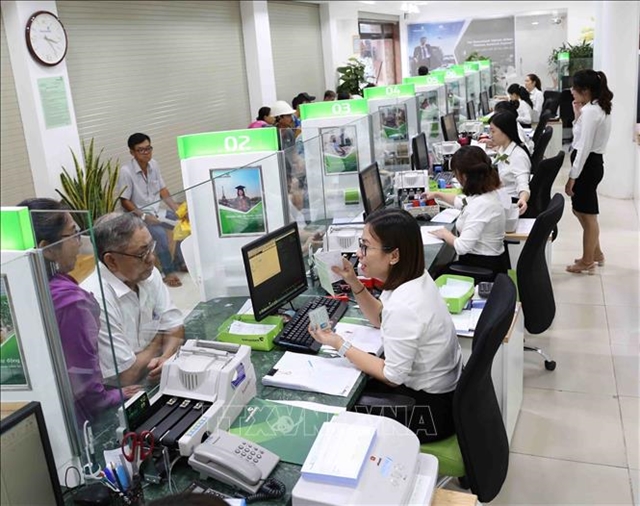 Economy
Economy

The Ministry of Finance (MoF) is concerned the COVID-19 pandemic would continue to affect State budget revenue in the coming months.

|
| Customers pay tax at a Vietcombank office in Hà Nội. VNA/VNS Photo |
HÀ NỘI — The Ministry of Finance (MoF) is concerned the COVID-19 pandemic would continue to affect State budget revenue in the coming months.
Though the budget revenue kept rising in the first eight months of this year, it has been on a downward trend since May 2021.
According to the MoF’s statistics, in the first eight months of 2021, total State budget revenue has been estimated at over VNĐ1 quadrillion, equaling 74.8 per cent of the estimate, and up 14.3 per cent over the same period in 2020. Of which, domestic revenue was estimated at VNĐ820.4 trillion, equaling 72.4 per cent of the estimate, up 12 per cent over the same period in 2020.
The budget balancing revenue from import and export activities contributed significantly to the total budget with VNĐ157.5 trillion, equaling 88.2 per cent of the estimate, up 31.2 per cent over the same period in 2020.
However, the complicated developments of the pandemic in the last months are expected to continue to affect budget revenues in the coming months. Specifically, out of VNĐ78.6 trillion of State budget revenue in August, domestic revenue is estimated at VNĐ63.2 trillion, down VNĐ14.2 trillion compared to July.
Domestic revenue, which accounts for a large proportion of total budget revenue, has been showing many signs of reduction due to the pandemic. According to the MoF’s data, due to the impact of the latest outbreak of the pandemic in April, domestic revenue has gradually decreased over the months, from VNĐ115.6 trillion in April to VNĐ85 trillion in May, VNĐ80.5 trillion in June, VNĐ77.4 trillion in July and VNĐ63.2 trillion in August.
Cao Anh Tuấn, General Director of the General Department of Taxation, said the sharp decline of August's budget revenue showed the heavy and comprehensive impact of the pandemic on most activities of the economy.
In fact, tax revenue in August, including value added and corporate income tax, hit the lowest level since January 2020. Budget revenue decreased sharply in most major taxes during the month, of which value added tax revenue reached only 57 per cent of the average revenue rate in in the first seven months of this year; special consumption tax revenue, 59.5 per cent; personal income tax revenue, 60 per cent; and environmental protection tax revenue, 72 per cent. In particular, the registration fee revenue last month reached only VNĐ970 billion, down 70 per cent compared to the average level of the first seven months of this year.
Director of the General Department of Customs Nguyễn Văn Cẩn said due to the very complicated development of the pandemic last month, import and export turnover of 19 southern provinces decreased by US$56 billion. Therefore, customs budget revenue is forecasted to remain very difficult in the last months of the year.
Minister of Finance Hồ Đức Phớc said the budget collection is facing many difficulties and challenges when its growth rate in the last months of the year is very low while the ministry must ensure funding for both the operation of the Government and the anti-pandemic work.
According to Phớc, the pandemic is becoming more complicated and serious than previous forecasts. Due to the rising number of infection cases in the country’s key economic areas, production and business there have been disrupted while the areas account for 70 per cent of the total budget revenue.
With the current complicated and unpredictable development of the pandemic, Tuấn said in the future, the General Department of Taxation will direct tax authorities at all levels to continue to closely monitor the development of the pandemic and the budget collection progress in each locality to promptly propose suitable measures to the competent authorities.
In particular, the department will strengthen the tax revenue collected from e-commerce and digital business activities besides strengthening the management of value-added tax refund, especially on areas and industries with high risks. — VNS




